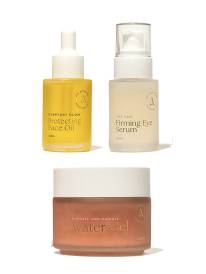Emma Jeffcoat Feet at Risk Interview
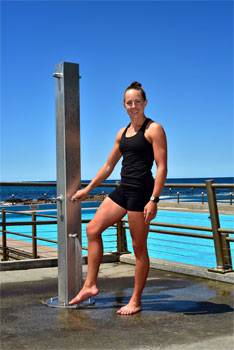
Did you put your foot in it?
Experts are warning Aussies of the risks of Summer pursuits, such as swimming, camping and going to the beach, after a new survey reveals that nearly two in three (62%) Aussies who use communal areas, admit to going barefoot.
This is leaving Australians vulnerable to nasty foot infections such as athlete's foot (Tinea), warts or fungal nail infections - leaving parents out of pocket, and both kids and adults in pain, experts say.
The survey was conducted by Excilor, and shows that despite most people (94%) worrying about fungal infections in communal areas, with one in three (33%) admitting to developing a foot infection, people are still choosing to go barefoot.
Sports podiatrist Muhammad (Mo) Maarj has urged Australians to take foot health seriously, as infections are easy to pick up, especially in the hotter months.
"Moist areas including swimming pools, showers, change rooms, toilet blocks and even pavements around the beach create the perfect breeding ground for these infections. Although it may seem harmless, you could be putting your health - and the health of your family - at risk by walking around barefoot," says Maarj.
"Those who spend a long time in their shoes or are exposed to moisture are also more prone to fungal infections – for example, everyday runners, those who compete in marathons or fun runs, walkers, and swimmers.
"With February here – traditionally a humid month in many parts of the country – it's important to be vigilant with foot health. And with kids going back to school and spending more time in shoes and socks, it's important for parents to keep an eye on their feet habits too."
The Excilor survey shows that more than half of parents (57%) admit that their child doesn't always wear thongs when around swimming pools or in public shower areas, despite 81% knowing that they could contract a wart or Tinea infection.
"Foot infections should not be downplayed. In fact, warts are a type of HPV that can occur anywhere around the body. A plantar wart under a big toe can cause someone to walk differently due to the pain. This compensation can result or exacerbate other overuse musculoskeletal injuries. Any type of foot disease can also be disastrous if you have Atherosclerosis or Diabetes and could even lead to amputation," explains Maarj.
"It's also a nuisance for the family, painful for children, and can be expensive - costing up to $500 in podiatrist consultations, surgery and treatments."
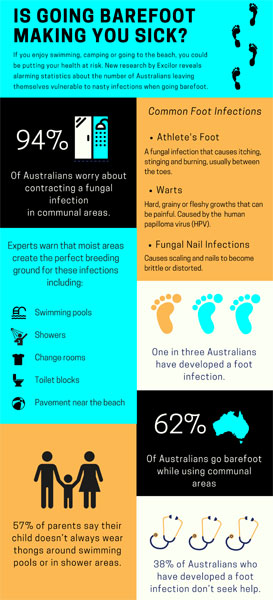 Don't put your head in the sand
Don't put your head in the sand
Surprisingly, the Excilor survey showed that 38% of those that have developed a foot infection don't seek help.
"There's often a stigma around foot infections and many people just hope for it go away on its own. But if you get in early and nip it in the bud, then you can do something about it before the problem gets worse," says Maarj.
However, he says that it's important to take steps to ensure you and your family have good foot health, especially over Summer. As even when a foot infection is treated, once you've been infected once, you are at a higher risk of reinfection.
"People shouldn't just put their head in the sand. If you take a few simple steps, foot infections can be easily prevented," adds Maarj.
Five tips to avoid getting infected this Summer:
Always keep your feet dry. If feet are wet, fungal and bacterial infections can easily spread.
Give your feet a break. Take your shoes and socks off when you get home to give your feet a break from the moist environment.
Keep it to yourself. If a family member has a fungal infection or wart, ensure they are taking measures to reduce the possibility of infecting others. Wear thongs in communal showers, and ensure feet are completely dry before walking on the carpet.
Pack your thongs. Always wear thongs in communal environments such as swimming pools and change rooms.
Take action. Invest in a preventative spray that acts as a shield against foot infections - or if you do get infected, act fast.
The research also showed:
1 in 5 (22%) of parents admit their child already has contracted a foot infection
40% of people were unaware that you can contract a foot infection from a pedicure / foot treatment
More than half (56%) did not know that even if you have successfully treated a foot infection, you could be reinfected from your socks or shoes
1 in 4 of parents (27%) admit that once their child has picked up a wart or tinea infection, they find it difficult to treat
Preventative measure
Excilor has recently launched a 3-in-1 protector spray – the only preventative solution available. It works as an 'invisible sock' that creates an effective, easy-to-apply barrier against the contraction of warts, athlete's foot and nail fungus during 8 hours of barefoot activity. For more information visit http://excilor.com/en-au/
"This product is an industry first. There's been a lot of research on treatments, but no one has provided a preventative product before – until now," says Maarj.
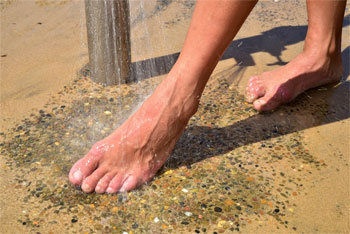 Interview with Emma Jeffcoat, Australian international triathlete
Interview with Emma Jeffcoat, Australian international triathlete
Question: How do you currently protect your feet?
Emma Jeffcoat: I am a routine user of Excilor 3 in 1 Protector spray before I go running and head to swimming. I also use orthopedic shoes for my feet and every day miles on the legs and will always be sure to have thongs packed for those shared public facilities like the showers and change rooms.
Question: What products do you use on your feet?
Emma Jeffcoat: I use Excilor 3 in 1 protector spray.
Question: Have you had feet-health issues, in the past?
Emma Jeffcoat: I have certainly experienced athletes foot/tinea in the past and I think this is what has made me so routine in my foot care and choice of products.
Question: How does having an active lifestyle put you at highest risk for feet conditions?
Emma Jeffcoat: Having an active lifestyle means often finding yourself in outdoor environments where you're barefoot and at risk, such as swimming pools, public pavements like at the beach, the gym, change rooms, showers and public toilets. Not only this, it's important to remember you can contract a foot infection just from wearing sweaty shoes and socks after the gym or a walk or run.
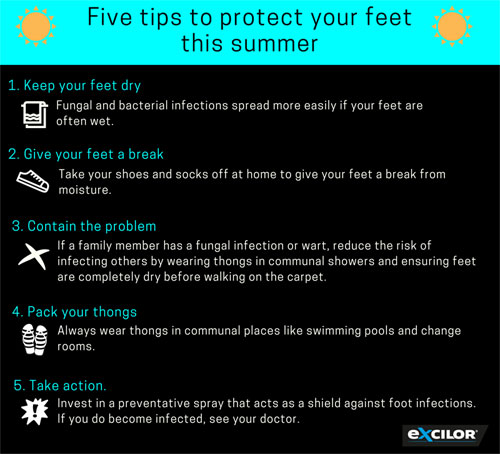 Question: What's a typical weeks training schedule like, for you?
Question: What's a typical weeks training schedule like, for you? Emma Jeffcoat: A typical week's training for me sits at around 30 hours of active training miles in the pool, cycling, running and at the gym, with up to four sessions per day.
Question: How many km's do you usually cover a week?
Emma Jeffcoat: Around 70km of running and 300km of cycling.
Question: What would we find in your gym/training bag?
Emma Jeffcoat: You'd find: A clean change of training attire, my ASICS runners, a towel, some Oakley lenses, earphones, a sweat bag for my used clothes, my Excilor 3 in 1 spray, toiletries and my True Protein Recovery Shake with a bite to eat!
Question: How do you continue to stay motivated?
Emma Jeffcoat: I love what I do, that certainly makes getting up to my 4.30am daily alarm easier. I have big goals, dreaming big and break it down into achievable chunks to keep myself moving along well!
Question: What's next, for you?
Emma Jeffcoat: The World Triathlon Series kicks off at the start of next month in Abu Dubai, kicking off a full season of international racing. In the meantime we have our domestic Season of racing in full swing with a World Cup race in Mooloolaba.
Interview by Brooke Hunter
MORE




